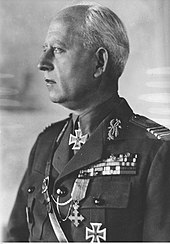Petre Dumitrescu
Petre Dumitrescu (born February 18, 1882 in Dobridor , † January 15, 1950 in Bucharest ) was a Romanian general in World War II . He led the third Romanian army in the war against the Soviet Union in the southwest.
Early life and military career
Dumitrescu was born in Dobridor, Dolj County . He began his military training in 1901 at the artillery and engineer officer school and completed it in 1903 with the rank of lieutenant . Dumitrescu was promoted to lieutenant in 1906 and then to captain five years later . In that year he was sent to the military academy in Bucharest for further training , which he graduated in 1913.
During the First World War Dumitrescu was promoted to major in 1916 and lieutenant colonel in 1917. In 1930 he became Brigadier General and in 1937 Division General . Between 1937 and the beginning of World War II, he served as a military attaché in Paris and Brussels . After he returned to Romania, he was given command of the 1st Army .
Commander of the 3rd Army
Initial successes
On March 25, 1941 he was given command of the 3rd Army and held it until the end of the war. On July 5, 1941, as part of the Barbarossa operation , he attacked northern Bukovina and took Chernivtsi , recapturing the area occupied by the Soviets on June 28, 1940. Then he crossed the Prut to retake northern Bessarabia . The German 11th Army covered Dumitrescu's right flank as he advanced towards the Dniester . At this point he switched targets with the German 11th Army, and the Germans continued to advance across the Dniester towards the Southern Bug, leaving Dumitrescu behind and securing Romanian territory. In September of that year, Dumitrescu repulsed a Soviet attempt to cross the Dniester in the east behind the German 11th Army.
After Hitler was able to convince Ion Antonescu to advance further than the 1940 border, Dumitrescu led the 3rd Army to the Crimea , where he took part in the Battle of the Sea of Azov . By October 10, the 3rd Army had covered over 1,700 kilometers from Romania, fought four major battles and fought 42 smaller skirmishes.
By this point, Dumitrescu's 3rd Army had taken 15,565 prisoners of war and owned 149 tanks , 128 artillery pieces , and more than 700 machine guns . At the same time, she had 10,541 injuries, of which 2,555 were dead, 6,201 were wounded and 1,785 were missing .
On 18 July 1942 he was appointed Colonel General transported and therefore was Antonescu's second in the ranking. Shortly after his promotion, he advanced in the direction of the Taman Peninsula between the Sea of Azov and the Black Sea , thus securing the German supply routes towards Stalingrad .
For his achievements in the Barbarossa company, Dumitrescu was awarded the Knight's Cross of the Iron Cross on September 1, 1942 . On April 4, 1944, he was the third Romanian to receive the oak leaves. In October 1942 he was awarded the military order of Michael the Brave, third class.
The beginning of the end
The German troops in Stalingrad needed urgent reinforcements, so that the high command of the army sent large parts of Dumitrescu's troops into the besieged city, so that the third army had far fewer troops than would have been necessary to defend the 138 km long section of the front . This was offset to some extent by the fact that all Romanian troops in the south-west of the Soviet Union were united in the 3rd Army. However, the Army High Command ignored his warning of a Soviet march in this region, just like his repeated proposals for an attack on the beachhead at Kletskaya .
In November 1942, the Red Army began Operation Uranus in the southwest, breaking through the Romanian front and forcing the Third Army to withdraw.
For a short time Dumitrescu let the third army dig in on the Tschir , but was pushed back further. In December 1943 the decision was made to withdraw strategically to the west.
After the Soviet breakthrough on the Dniester , Dumitrescu's plan was to reach Bucharest while avoiding any contact with the Red Army. Instead, however, Dumitrescu's troops were ambushed by the Red Army. When the remnants of the 3rd Army reached Bucharest, the Soviets had taken more than 130,000 Romanian prisoners of war . At this point Romania changed sides and so did Dumitrescu with his troops, so that his 3rd Army took about 4500 German prisoners.
After the war
War crimes proceedings were opened against Dumitrescu on May 15, 1946 by the new communist government , but he was ultimately acquitted for lack of evidence . Dumitrescu died in Bucharest in 1950.
Web links
- General Petre Dumitrescu , at WorldWar2.ro (English)
| personal data | |
|---|---|
| SURNAME | Dumitrescu, Petre |
| BRIEF DESCRIPTION | Romanian general |
| DATE OF BIRTH | February 18, 1882 |
| PLACE OF BIRTH | Dobridor |
| DATE OF DEATH | January 15, 1950 |
| Place of death | Bucharest |

